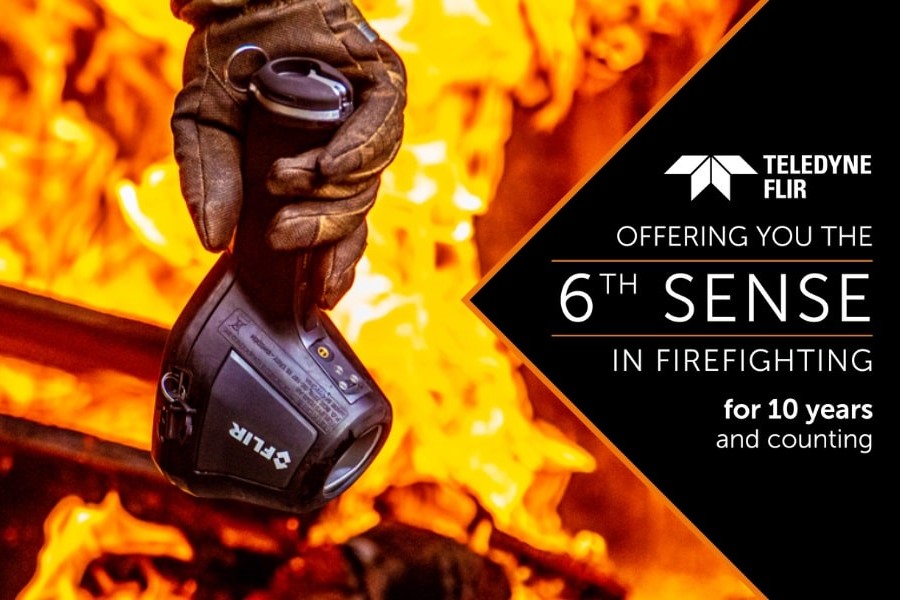
Teledyne FLIR celebrates ten years of its K-series firefighting cameras
Teledyne FLIR has marked the 10 year anniversary of the release of its K-series of firefighting cameras
In March 2013, FLIR (now Teledyne FLIR) released the first models in its K-series thermal imaging cameras for firefighting applications
A decade down the line, the K-series remains a market leader in firefighting applications, allowing crews to visualise a plan of attack, locate hot spots and save lives – in ultra-quick time.
THERMAL IMAGING AND THERMAL CAMERAS: VISIT THE FLIR BOOTH AT EMERGENCY EXPO
Teledyne FLIR K-series thermal imaging cameras, the initial launch
The firefighting success story began with the launch of the K40 and K50 thermal imaging cameras in the spring of 2013 with the idea of providing firefighters with a tool they can rely on to protect the lives of crew and save the lives of others.
Displaying different colour modes for every situation, the K40 and K50 models met a number of key market criteria, including affordability, dependability and ease-of-use.
Furthermore, the devices displayed clear thermal images and produced simple reports.
Following the initial success and uptake of the K40 and K50, FLIR set about expanding the range. In January 2015, at the Intersec exhibition for fire protection technologies in Dubai, the company released its K45 and K55 models with enhanced field-of-view and thermal sensitivity.
Next to join the line up in June 2015 were the K2 and K65 thermal imaging cameras, with a public unveiling at the Interschutz exhibition in Hanover.
The FLIR K2 combines capability, ruggedness and reliability in an affordable package.
With features such as Multi-Spectral Dynamic Imaging (MSX®), easy-to-use buttons and operability in temperatures up to 260°C, the K2 is a small investment that pays big dividends, saving lives, protecting property and ensuring firefighter safety.
Product development
FLIR’s K65 is the advanced, feature-rich thermal imaging camera required when NFPA compliance is a must.
With fully sealed connectors and a secured battery, the K65 is fully compliant with the NFPA 1801-2021 standard for thermal imaging cameras covering usability, image quality and durability in firefighting tasks.
With the release of four models in 2015 – K45, K55, K2 and K65 – and initial demand proving high, FLIR felt it an opportune moment to discontinue the original K40 and K50 models, especially as yet more K-series thermal imaging cameras were already in development and nearing release.
In April 2016, at the FDIC exhibition and conference in Indianapolis, FLIR took the opportunity to introduce its brand new K33 and K53 models.
The concept behind the K33 was to provide an economical, easy-to-use option that did not sacrifice clarity or performance.
This impressive thermal imaging camera features FSX Flexible Scene Enhancement, which intensifies structural and textural details in thermal images.
The augmented perspective and orientation help improve situational awareness and give firefighters a greater sense of confidence and safety.
In comparable terms, the K53 offers the same clarity and performance, but with enhancements such as greater IR resolution and thermal sensitivity.
Teledyne FLIR K-series thermal imaging cameras, latest arrival
FLIR’s most recent addition to its K-series arrived in April 2019 with another grand unveiling at FDIC.
Taking the number of available K-series cameras to seven, the K1 situational awareness camera is a rugged, compact thermal device that serves as an extra set of eyes on the fire scene, allowing commanders, officers and inspectors to complete a rapid yet thorough 360° assessment in total darkness and through smoke.
With a bright, integrated flashlight, the FLIR K1 illuminates the scene to help users guide and manage crew members more effectively.
Peter Dekkers, Global Business Development Manager – FIRE EMEA at Teledyne FLIR, says
“Ten years ago, the market for thermal imagers for firefighting was somehow static: little innovation, clumsy design, battery challenges, blurry images and so on.
“Moreover, the hefty price tag didn’t support broader adoption among firefighters worldwide. So we took a huge risk by investing in this market, which was – at a first glance – not particularly dynamic.
However, we love a challenge and decided to use our in-house industrial and defense expertise in addressing the Fire market.
“With the introduction of our K-Series we set a new standard with superb image quality, ease of use, robustness and reliability.
All at a much friendlier price point to not only benefit smaller city or volunteer departments, but also metropolitan departments scaling up their ability to use thermal imaging.”
Dekkers added: “Of course, with broader use comes higher expectations.
We therefore keep investing in our solutions, where continuous focus on ergonomics and a super clear image generates trust in reading fires correctly.”
Read Also
Emergency Live Even More…Live: Download The New Free App Of Your Newspaper For IOS And Android
Teledyne Flir And Emergency Expo: The Journey Goes On!
Thermal Imaging: Understanding High & Low Sensitivity
Thermal Imaging Always At Your Fingertips With FLIR Ignite Cloud Service
FLIR Thermal Imaging Cameras: Insight Fire Training Tips
Italy, Fires In The Thermal Imaging Cameras Of Fire Brigade Drones / VIDEO


